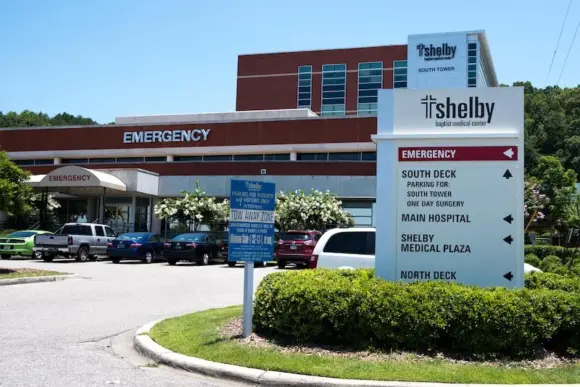The Alabama Supreme Court revived a medical malpractice lawsuit and a wrongful death lawsuit filed by the estate of a man who died a day after receiving medical treatment for injuries suffered during a motor vehicle crash.
In a decision Friday, the high court ruled that the trial court judge should have held an evidentiary hearing to determine whether an attorney representing the family had authority reach a settlement to release all claims related to the death of Charles Lewis Evans in exchange for a $50,000 payment from his auto insurer.
The 8-1 ruling reversed a Chilton County Circuit Court judge’s decision to dismiss a wrongful death claim against the driver of the car that struck Evans’ vehicle and also a malpractice suit filed against a hospital and other medical providers.
On Jan. 12, 2016, a vehicle driven by Terry Short collided with a vehicle carrying Charles Lewis Evans, his brother John Edward Evans and his sister-in-law Linda Claxton Evans. Charles and John were transported and treated at Shelby Baptist Medical Center in Alabaster. Charles was discharged the same night.
Charles collapsed at his home the next day and was transported by ambulance to the University of Alabama at Birmingham Hospital. He died at the hospital that night.
Two days after the accident, attorney Nicholas Vocino with the Slocumb Law Firm sent a letter to National General Insurance Co., Short’s insurer, giving notice that he was representing Charles’ heirs and that their insured was at fault for the crash. A claims adjuster told Vocino that Short’s policy had a $50,000 per accident limit and offered to settle the claim for that amount.
The next month, the insurer sent a check for $20,000 to Linda Evans and a check for $15,000 to John Evans. The insurer sent a third check for $15,000 on March 22 to Robert Bowers, a county administrator that the probate court had appointed to represent Charles’ estate.
National General also sent documents to John and Linda that released “all claims” related to the January 2016 crash. On Sept. 6, 2016, John and Linda both signed release agreements in their names. John also filed a release agreement made out to “the estate of Charles Evans” titled “release of all claims.” A notary verified that John signed the document on behalf of his deceased brother.
Less than a month later, however, an attorney representing John Evans filed a medical malpractice lawsuit against the company that owned the Shelby Baptist hospital and other medical providers involved with Charles Evans’ medical treatment. The lawsuit also named Short as a defendant.
Short filed a motion to dismiss the lawsuit in July 2018 on the grounds that the Evans family had released him from all claims. Bowers, however, disputed that there had been any release for claims relating to Charles. His name had been listed on the back of National General’s check, but Bowers said he never endorsed the check and had not given permission for anyone else to sign it for him.
A claims adjuster for National General testified that she believed Vocino with the Slocumb law firm had authority to execute a settlement agreement. She said that she could not verify the authenticity of the signatures on the back of the settlement checks but did say that the check “was fully negotiated.”
A Chilton County judge dismissed the wrongful death suit against Short and also the medical malpractice claims against the hospital and medical providers. The judge rejected arguments that the Slocumb law firm had acted without authority from Charles Evans’ designated representative.
The Supreme Court’s opinion says the trial court did not give Bowers and opportunity to present evidence that he never agreed to the settlement agreement that released all claims relating to Charles.
“Thus, the trial court deprived Bowers of his right to respond and to present evidence showing that the release purporting to address the claims relating to Charles did not apply to the wrongful-death claims against the malpractice defendants and was not binding against him,” the opinion says.
The court said the trial court similarly did not hear any evidence as to whether Bowers had approved settlement of the wrongful death suit against Short. The Supreme Court reversed the decision granting summary judgment and remanded the case to the trial court with instructions to hold an evidentiary hearing.
Chief Justice Tom Parker dissented. He wrote a separate opinion saying that National General had no reason to believe that Volcino was acting outside his authority.
Justice William B. Sellers concurred with the result of the decision, but wrote a separate opinion expressing reservations.
“And I worry that future third parties will perceive this result as requiring them to ignore representations made by an attorney in favor of communicating directly with the attorney’s client, placing them in the awkward position of intruding into the attorney-client relationship and thus needlessly convoluting the settlement process,” the opinion says.
CORRECTION: An earlier version of this article incorrectly attributed comments by Justice William B. Sellers to another justice on the court.
Was this article valuable?
Here are more articles you may enjoy.


 Bayer to Make $10.5 Billion Push to Settle Roundup Cases
Bayer to Make $10.5 Billion Push to Settle Roundup Cases  When the Workplace Is Everywhere: The New Reality of Workers’ Comp Claims
When the Workplace Is Everywhere: The New Reality of Workers’ Comp Claims  NYC Travel Snarled by Snow as Central Park Gets 15 Inches
NYC Travel Snarled by Snow as Central Park Gets 15 Inches  Gas-Guzzler Revival Risks Dead-End Future for US Automakers
Gas-Guzzler Revival Risks Dead-End Future for US Automakers 